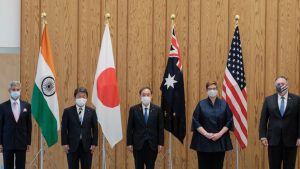
Amid shifting geopolitical realignments in the Indo-Pacific region, the foreign ministers of the Quad countries including the US, India, Australia and Japan, will hold their first meeting since the change of guard in Washington.
The ministerial meeting of the Quad on February 18 will focus on advancing a free, open and inclusive Indo-Pacific and jointly tackling challenges arising out of the pandemic in areas of health and economic recovery. India’s External Affairs Minister S. Jaishankar, US Secretary of State Antony J. Blinken, Australian Minister of Foreign Affairs Marise Payne and Japanese Foreign Minister Toshimitsu Motegi will share their thoughts on the evolving post-pandemic Indo-Pacific region.
Ahead of the meeting, the US State Department underlined the US commitment to the Quad. “These discussions with the Quad foreign ministers are critical to advancing our shared goals of a free and open Indo-Pacific and rising to the defining challenges of our times,” said Mr Ned Price, spokesman of the State Department.
The ministerial meeting could also firm up plans for a Quad summit of the leaders of the four countries later this year, well-placed sources told India Writes Network.
Significantly, the Quad ministerial meeting takes place less than a month after Mr Biden moved into the White House, suggesting that the new US president is set to take the Quad to a higher level in the coming months.
The US and Japan have been specially vocal about elevating the level of Quad so that the four-nation grouping can effectively address the China challenge, but India, despite recent border tensions with Beijing, prefers an incremental approach as it does not want to be seen as part of any overt China containment plan.
In the last Quad ministerial meeting in Tokyo five months ago, Mr Jaishankar had enunciated India’s position saying that the Quad remains committed to a rules-based international order, “underpinned by the rule of law, transparency, freedom of navigation in the international seas, respect for territorial integrity and sovereignty, and peaceful resolution of disputes”.
The Quad ministerial meeting has been preceded by some sharp rhetoric from Beijing. China’s state-run Global Times has published an expert’s commentary which warned US President Joe Biden that renewing the Quad would be a “serious strategic blunder,” saying he may trigger “a severe strategic confrontation” with Beijing by trying to prevent its dominance.
The commentary also warned India to end the Quad format, advising New Delhi to not “completely tie itself to the US’ anti-China chariot.”
The last meeting of the Quad took place in Tokyo in October last year. The Quad nations hold four-way naval exercises in the Bay of Bengal and Arabian Sea from time to time, with the last drill held in November 2020.
Author Profile

- Manish Chand is Founder and Editor-in-Chief of India Writes Network (www.indiawrites.org) and India and World, a pioneering magazine focused on international affairs. He is CEO, Centre for Global India Insights, an India-based think tank focused on global affairs.
Latest entries
 India and the WorldFebruary 17, 2026South-by-South: Focus on people-centric solutions at India AI summit
India and the WorldFebruary 17, 2026South-by-South: Focus on people-centric solutions at India AI summit India and the WorldFebruary 7, 2026Modi hails interim India-US trade deal, Goyal says no concessions made on agriculture
India and the WorldFebruary 7, 2026Modi hails interim India-US trade deal, Goyal says no concessions made on agriculture India and the WorldFebruary 2, 2026Trump announces trade deal with India, Modi ‘delighted’
India and the WorldFebruary 2, 2026Trump announces trade deal with India, Modi ‘delighted’ India and the WorldJanuary 31, 2026Palestinian minister bats for mediatory role for India in ending Gaza conflict
India and the WorldJanuary 31, 2026Palestinian minister bats for mediatory role for India in ending Gaza conflict







